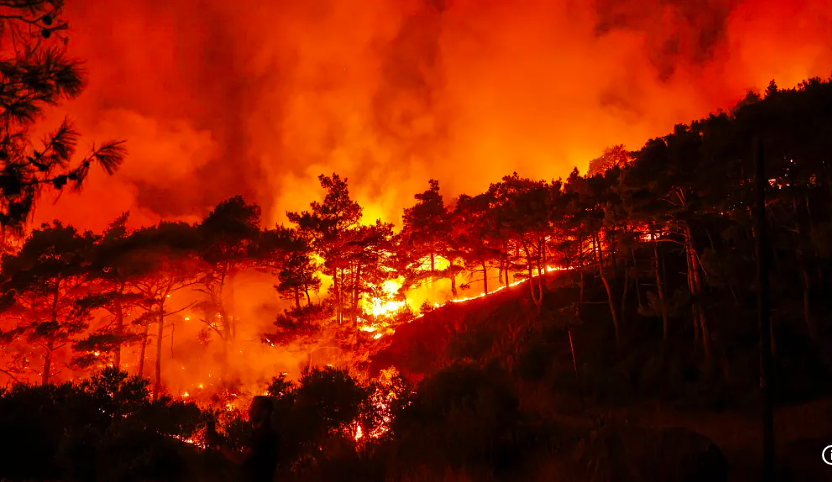
Syria Appeals to EU for Help as Massive Wildfires Ravage Northwestern Coast
As massive wildfires continue to scorch Syria’s northwestern coast for the sixth consecutive day, the country has made a formal appeal to the European Union for emergency assistance. The flames, which erupted last week, have proven devastatingly persistent despite reinforcements from neighbouring countries including Jordan, Turkey, and Lebanon. With hundreds of blazes across key coastal provinces and the threat of further escalation, Syrian authorities are now urgently calling for broader international intervention.
A Region Under Fire
Register for Tekedia Mini-MBA edition 18 (Sep 15 – Dec 6, 2025) today for early bird discounts. Do annual for access to Blucera.com.
Tekedia AI in Business Masterclass opens registrations.
Join Tekedia Capital Syndicate and co-invest in great global startups.
Register to become a better CEO or Director with Tekedia CEO & Director Program.
The coastal provinces of Latakia and Tartous have been hardest hit by the blazes, which have spread rapidly due to rugged terrain, heavy winds, and dry conditions. According to Raed Saleh, Syria’s Minister of Emergency and Disaster Management, the civil defence teams have responded to 334 wildfires across the country since the beginning of July, with a significant concentration in Latakia.
Saleh took to X (formerly Twitter) on Tuesday to confirm the country’s official appeal to the EU. “Communication has also been established with the European Union, and there is a possibility of air support from Cyprus today to bolster the extinguishing efforts,” he posted. “We are facing significant field challenges, most notably the rugged terrain, the absence of firebreaks, active winds, and the presence of mine remnants and unexploded ordnance.”
These complications have made firefighting operations perilous and inefficient. In conflict-affected regions, especially near old battle lines, unexploded war ordnance still litters the landscape—posing lethal risks not only to civilians but also to emergency response teams.
Regional and International Support
Despite the complexity of the situation, Syria has not been left to fight the flames alone. Reinforcements from Jordan, Turkey, and Lebanon have been assisting Syrian teams since early last week. The Lebanese Army confirmed on Monday that it dispatched two helicopters to help suppress the fires in coordination with Syrian authorities.
Additionally, United Nations teams were deployed to the coastal areas over the weekend to assess the damage and determine urgent humanitarian needs. “UN teams are on the ground conducting urgent assessments to determine the scale of the disaster and to identify the most immediate humanitarian needs,” stated Adam Abdelmoula, UN Resident and Humanitarian Coordinator in Syria. “The UN reiterates its solidarity with the people of Syria at this critical moment and stands ready to work alongside all stakeholders to ensure that no one is left behind in the response and recovery efforts.”
There are currently 120 emergency teams actively engaged in battling the blazes. Although initial efforts succeeded in controlling up to 90% of the fires by the second day, heavy winds and detonations from unexploded ordnance quickly reignited and spread the fires.
Climate Change and Regional Vulnerabilities
This wave of wildfires comes amid broader environmental stress gripping the Eastern Mediterranean region. Experts have long warned that rising global temperatures and prolonged droughts, fuelled by climate change, are making summer fires more frequent and intense.
Syria is particularly vulnerable due to years of war, a weakened infrastructure, and the impact of global warming. This year’s below-average winter rainfall has exacerbated the crisis. Springs and rivers that traditionally provide drinking water to the population have gone dry, leaving many Syrians facing acute water shortages.
With parched vegetation and dry winds, the region has become a tinderbox. Fires that might once have remained localised now explode into full-scale disasters—overwhelming local capacity and endangering countless lives.
A Plea for Global Solidarity
The Syrian government’s call to the European Union underscores the severity of the crisis. While support from neighbouring countries has been instrumental, the scale of the wildfires requires a more robust, multinational response. The possibility of air support from Cyprus offers a glimmer of hope, but much more will be needed to bring the fires under control and prevent similar catastrophes in the future.
The international community faces a critical test: to respond not only with immediate aid but also with long-term commitments to climate adaptation, environmental protection, and post-conflict recovery.
In this moment of crisis, the people of Syria need more than sympathy—they need action. The flames consuming their forests and homes are not just a national emergency but part of a broader environmental and humanitarian challenge that demands a united response.
Meta Description:
As wildfires rage through Syria’s northwestern coast, authorities appeal to the EU for help. Climate change, minefields, and depleted resources make firefighting efforts dangerously difficult.
Uploaded files:

